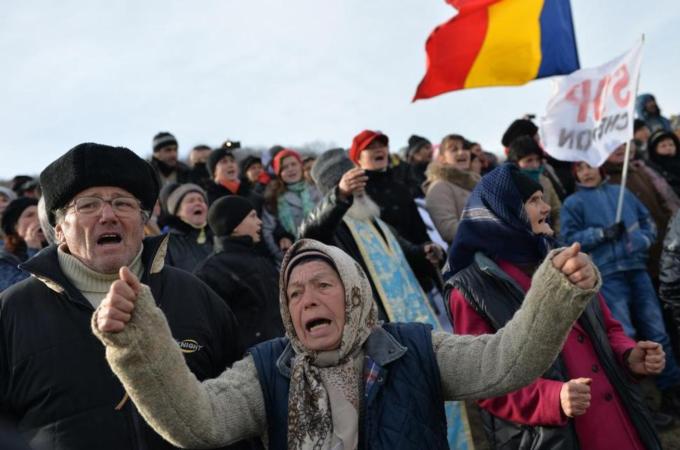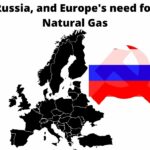In the largely unknown village of Pungesti, Romania, a battle is being waged between locals fighting off an illegal encroachment by Chevron seeking to deploy hydraulic fracturing for drilling in shale reserves. According to reports I’ve found, the local council voted to deny Chevron access to the site, but the national government is ignoring the will of the locals, and has sent in riot police to brutally squash the uprising to allow Chevron to go about its business. Additionally, the land Chevron is seeking to drill appears to have been illegally transferred to Chevron by the local Mayor.
The site is along the border with Moldova (a.k.a. Basarabia). Protesters have been blockading the site since October, but on December 2 national police moved against the protesters. The police brutally attacked the protesters, even though they were camped on private property with permission of the property owner. Many arrests were made, people beaten, etc etc etc, very brutal.
One report put it this way:
Since gendarmes came in the village, people are beaten and you do not even allowed to go to pasture with cows. Villagers are simply isolated from the world, sequestered in their households, all for a private company to [do its business]
In the bigger context, there are other efforts across Romania to fight against not just fracking but a gold mining project that’s near an ancient Dacian archeological area.
This is the extent to which the oil companies are going to get more fossil fuels. They are subverting the laws of Romania, subverting the government, and using the government as shock troops to put down protests, and jam through drilling activities so they can extract fossil fuel resources, selling the fossil fuel products to the rest of us.
According to one report, Romanian law is very lenient in giving fossil fuels to the extracting companies. Those companies are allowed to export 100% of the fossil fuels, so that none of it is directed to the benefit of the people. It is the local people who bear the brunt of the externalities, the poisoning of their water and land, while they get none of the benefits.
Pungesti: Romania’s battlefield against Chevron![]() – (December 13, 2013) It describes Chevron’s presence and proposed drilling as illegal because
– (December 13, 2013) It describes Chevron’s presence and proposed drilling as illegal because
Romania’s Petroleum Law doesn’t recognize drilling for non-conventional fossil fuel sources — the Romanian Green Party (Partidul Verde) wrote a detailed analysis on their website![]()
Chevron probably doesn’t have legal right to the land, because the Mayor illegally transferred the land
Pungesti, Romania: people versus Chevron and riot police![]() : (December 12, 2013) Reports on the suppression of protests by national riot police. It began on December 2nd, one day after Romania’s National Day, when the Government imposed a military style blockade against the village with widespread abuse of people. People from all over the country went to Pungesti to protest against Chevron. Many were arrested, were beaten, riot police even stormed into peoples houses searching for protesters and beating people some more.
: (December 12, 2013) Reports on the suppression of protests by national riot police. It began on December 2nd, one day after Romania’s National Day, when the Government imposed a military style blockade against the village with widespread abuse of people. People from all over the country went to Pungesti to protest against Chevron. Many were arrested, were beaten, riot police even stormed into peoples houses searching for protesters and beating people some more.
It’s a very vivid report of an extremely brutal crackdown against protesters.
The people there are very poor and just want to be able to farm their land in peace.
Interview With Brianna Caradja, Pungesti Fighter And Romanian Activist![]() : (December 7, 2013) One of the activists describing what has been happening in Pungesti.
: (December 7, 2013) One of the activists describing what has been happening in Pungesti.
Police remove protesters from Chevron’s fracking site in Romania![]() : (December 5, 2013) This is a report in the mainstream press that dares to describe the brutal crackdown by the Romanian national police. That’s unlike this Reuters report
: (December 5, 2013) This is a report in the mainstream press that dares to describe the brutal crackdown by the Romanian national police. That’s unlike this Reuters report![]() that downplays the protesters, and instead presents the corporate point of view that this fracking stuff is great for business.
that downplays the protesters, and instead presents the corporate point of view that this fracking stuff is great for business.
Riots. Pungesti hunted and terrorized villagers. Not allowed to go to the toilet or![]() : A report in the Iasi news website (Iasi is the capital of the region) discussing the brutal crackdown.
: A report in the Iasi news website (Iasi is the capital of the region) discussing the brutal crackdown.
Freedom of the press in “special area” in Pungesti. Read blowing dialogue![]() : Journalists are being denied access to the site, meaning that there’s little chance for an independent accounting of what’s going on. This particular report captures one dialog between a reporter and a police officer, with the officer simply forcing the reporter to leave and not take pictures.
: Journalists are being denied access to the site, meaning that there’s little chance for an independent accounting of what’s going on. This particular report captures one dialog between a reporter and a police officer, with the officer simply forcing the reporter to leave and not take pictures.
Romanian police ‘brutally’ remove protesters opposed to Chevron fracking![]() : A report from the day the crackdown began, saying that since October an encampment had blocked Chevron, but on the 2nd a combination of government riot police and firemen moved to break the resistance.
: A report from the day the crackdown began, saying that since October an encampment had blocked Chevron, but on the 2nd a combination of government riot police and firemen moved to break the resistance.
Battling Extractive Industries in Romania![]() : Some bigger context – a December 10 vote in the Romanian parliament would have enacted a law allowing projects involving the extraction and processing of mineral resources could have been declared “of exceptional public interest” allowing project promoters to receive extraordinary powers, such as the right to conduct expropriations, skip permitting procedures for working on archaeological sites, and be reissued permits within 60 days if they were cancelled by courts.
: Some bigger context – a December 10 vote in the Romanian parliament would have enacted a law allowing projects involving the extraction and processing of mineral resources could have been declared “of exceptional public interest” allowing project promoters to receive extraordinary powers, such as the right to conduct expropriations, skip permitting procedures for working on archaeological sites, and be reissued permits within 60 days if they were cancelled by courts.
This was to have been for the benefit of a gold mine proposed to be built by the Rosia Montana Gold Corporation. But the law was turned down by the parliament.
Chevron announces resumption of activity in the Silistea-Pungesti![]() : This Romanian report says that Chevron was able to resume operations after a bit of protests. The report takes the corporate point of view, and describes how Chevron portrays this as the protesters had done illegal things, breaking down barricades and throwing rocks, etc, and have asked the Police to investigate and prosecute anybody responsible.
: This Romanian report says that Chevron was able to resume operations after a bit of protests. The report takes the corporate point of view, and describes how Chevron portrays this as the protesters had done illegal things, breaking down barricades and throwing rocks, etc, and have asked the Police to investigate and prosecute anybody responsible.
Romanians protest at Chevron shale gas activities![]() : Says the protests caused interruption to Chevron’s activity, and that riot police forcibly removed dozens of protesters.
: Says the protests caused interruption to Chevron’s activity, and that riot police forcibly removed dozens of protesters.
- Highway design could decrease death and injury risk, if “we” chose smarter designs - March 28, 2015
- GM really did trademark “range anxiety”, only later to abandon that mark - March 25, 2015
- US Government releases new regulations on hydraulic fracturing, that some call “toothless” - March 20, 2015
- Tesla Motors magic pill to solve range anxiety doesn’t quite instill range confidence - March 19, 2015
- Update on Galena IL oil train – 21 cars involved, which were the supposedly safer CP1232 design - March 7, 2015
- Another oil bomb train – why are they shipping crude oil by train? – Symptoms of fossil fuel addiction - March 6, 2015
- Chevron relinquishes fracking in Romania, as part of broader pull-out from Eastern European fracking operations - February 22, 2015
- Answer anti- electric car articles with truth and pride – truth outshines all distortions - February 19, 2015
- Apple taking big risk on developing a car? Please, Apple, don’t go there! - February 16, 2015
- Toyota, Nissan, Honda working on Japanese fuel cell infrastructure for Japanese government - February 12, 2015














